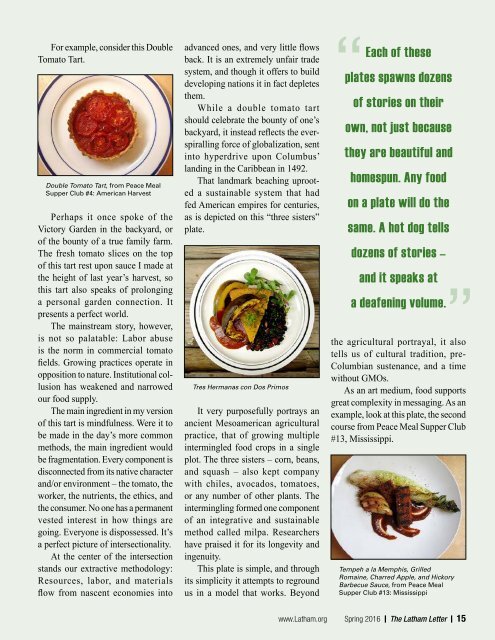Latham Letter
LL_16_SP
LL_16_SP
You also want an ePaper? Increase the reach of your titles
YUMPU automatically turns print PDFs into web optimized ePapers that Google loves.
For example, consider this Double<br />
Tomato Tart.<br />
Double Tomato Tart, from Peace Meal<br />
Supper Club #4: American Harvest<br />
Perhaps it once spoke of the<br />
Victory Garden in the backyard, or<br />
of the bounty of a true family farm.<br />
The fresh tomato slices on the top<br />
of this tart rest upon sauce I made at<br />
the height of last year’s harvest, so<br />
this tart also speaks of prolonging<br />
a personal garden connection. It<br />
presents a perfect world.<br />
The mainstream story, however,<br />
is not so palatable: Labor abuse<br />
is the norm in commercial tomato<br />
fields. Growing practices operate in<br />
opposition to nature. Institutional collusion<br />
has weakened and narrowed<br />
our food supply.<br />
The main ingredient in my version<br />
of this tart is mindfulness. Were it to<br />
be made in the day’s more common<br />
methods, the main ingredient would<br />
be fragmentation. Every component is<br />
disconnected from its native character<br />
and/or environment – the tomato, the<br />
worker, the nutrients, the ethics, and<br />
the consumer. No one has a permanent<br />
vested interest in how things are<br />
going. Everyone is dispossessed. It’s<br />
a perfect picture of intersectionality.<br />
At the center of the intersection<br />
stands our extractive methodology:<br />
Resources, labor, and materials<br />
flow from nascent economies into<br />
advanced ones, and very little flows<br />
back. It is an extremely unfair trade<br />
system, and though it offers to build<br />
developing nations it in fact depletes<br />
them.<br />
While a double tomato tart<br />
should celebrate the bounty of one’s<br />
backyard, it instead reflects the everspiralling<br />
force of globalization, sent<br />
into hyperdrive upon Columbus’<br />
landing in the Caribbean in 1492.<br />
That landmark beaching uprooted<br />
a sustainable system that had<br />
fed American empires for centuries,<br />
as is depicted on this “three sisters”<br />
plate.<br />
Tres Hermanas con Dos Primos<br />
It very purposefully portrays an<br />
ancient Mesoamerican agricultural<br />
practice, that of growing multiple<br />
intermingled food crops in a single<br />
plot. The three sisters – corn, beans,<br />
and squash – also kept company<br />
with chiles, avocados, tomatoes,<br />
or any number of other plants. The<br />
intermingling formed one component<br />
of an integrative and sustainable<br />
method called milpa. Researchers<br />
have praised it for its longevity and<br />
ingenuity.<br />
This plate is simple, and through<br />
its simplicity it attempts to reground<br />
us in a model that works. Beyond<br />
Each of these<br />
plates spawns dozens<br />
of stories on their<br />
own, not just because<br />
they are beautiful and<br />
homespun. Any food<br />
on a plate will do the<br />
same. A hot dog tells<br />
dozens of stories –<br />
and it speaks at<br />
a deafening volume.<br />
the agricultural portrayal, it also<br />
tells us of cultural tradition, pre-<br />
Columbian sustenance, and a time<br />
without GMOs.<br />
As an art medium, food supports<br />
great complexity in messaging. As an<br />
example, look at this plate, the second<br />
course from Peace Meal Supper Club<br />
#13, Mississippi.<br />
Tempeh a la Memphis, Grilled<br />
Romaine, Charred Apple, and Hickory<br />
Barbecue Sauce, from Peace Meal<br />
Supper Club #13: Mississippi<br />
www.<strong>Latham</strong>.org Spring 2016 | The <strong>Latham</strong> <strong>Letter</strong> | 15


